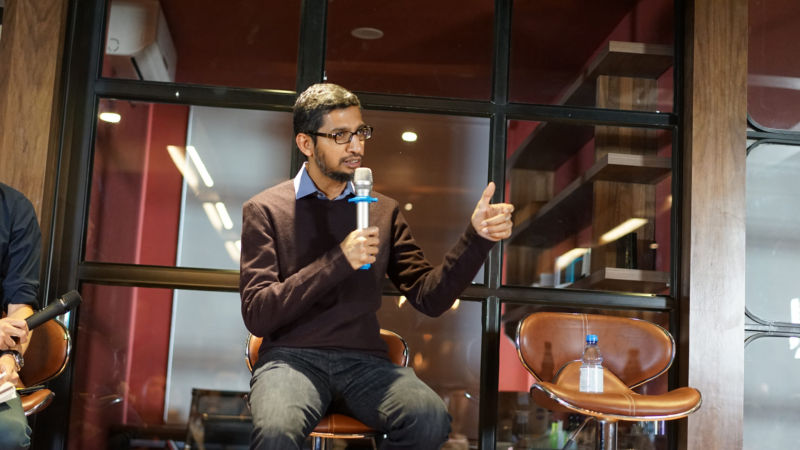
Gab, a Twitter rival popular with the Breitbart crowd, is suing Google. The lawsuit, filed in Pennsylvania federal court on Thursday, argues that Google violated antitrust laws when it rejected Gab's app from its Android app store.
Gab says Google rejected Gab to help its business partner Twitter. Google and Twitter signed a data-sharing deal in 2015, and Gab argues the deal gave Google a financial stake in Twitter's success. The deal "makes the Google search engine immeasurably more valuable," Gab writes in its lawsuit. As a result of the deal, "the two companies' user bases have essentially been merged."
In Gab's view, the decision to block its app from the Play Store "is intended to, and does, unlawfully protect the financial and strategic benefits it enjoys by virtue of its partnership with Twitter, Gab's chief competitor, from other competitors."
But Mark Patterson, an antitrust law expert at Fordham University, is skeptical that Gab's lawsuit will prevail. However, he says the basic legal theory behind the lawsuit is sound: Google really could get in trouble if it blocked Gab to help its business partner, Twitter. But Gab would have to prove that this was Google's motivation.
As Patterson told Ars, "that's probably not what was going on."
Why courts are unlikely to buy Gab's argument
Gab has attracted a number of controversial "alt-right" figures such as Internet troll Milo Yiannopoulos and neo-Nazi Daily Stormer editor Andrew Anglin after they were kicked off of Twitter. Patterson finds it perfectly plausible that Google could have believed that being associated with Gab—and, therefore, with Gab's controversial users—would be bad for Google's brand. And if that was Google's motivation, then Google would be on safe legal ground even if Google hasn't been entirely consistent in enforcing its content rules against other social media apps.
"A claim that is based on a view that Google should be even-handed really only works in antitrust if it makes a claim based on some kind of competitive advantage" to Google, Patterson says. Even if Gab could show that Google was a monopolist, Patterson argued, it wouldn't have a legal obligation to be fair to all app store applicants. It would just have an obligation not to use its power in ways that give Google an unfair competitive advantage. And the lawsuit doesn't present any evidence that Google's decision was motivated by a desire to help Twitter or any other anti-competitive objective.
Of course, it's impossible to know for sure without access to internal Google documents. And that means a key hurdle for Gab will be when Google asks the judge to dismiss the lawsuit. Google is likely to argue that Gab hasn't presented enough evidence to establish anti-competitive behavior on Google's part, Patterson says, and Google has won past antitrust lawsuit at this phase.
If Gab's lawsuit were to survive a motion to dismiss, then Gab would have the opportunity to conduct discovery—obtaining internal Google e-mails and other materials that could substantiate Gab's suspicions of anticompetitive intent. But Patterson told Ars he didn't see anything in this lawsuit that makes him optimistic that this case will last longer than others Google has faced.
A legal loss could still be a PR win for Gab
Of course, Gab and its lawyers might not actually be expecting to win the case. The main goal might simply be to burnish Gab's reputation as a plucky underdog fighting against big technology companies.
Gab CEO and co-founder Andrew Torba has portrayed Google and Silicon Valley more generally as a bastion of political correctness. He raised $1.07 million in a crowdfunding campaign earlier this year and relies on revenue from around 3,000 monthly subscribers.
In fact, the lawsuit sometimes reads as though it's written more for Gab's Google- and Twitter-hating fans than for the judge who will be overseeing the case. The complaint includes a wide-ranging summary of recent culture-war controversies involving Google or Twitter, including the firing of Google engineer James Damore, allegations that Google censored journalist Kashmir Hill, the firing of a Google critic from the New America Foundation, and Twitter's decision to strip Milo Yiannopoulos of his blue "verified" checkmark logo.
These incidents seem to have little bearing on Gab's legal argument, which is focused on Google's alleged desire to help Twitter strangle a competitor. But they certainly bolster Gab's larger political argument—that Google and Twitter are intolerant left-wing institutions that try to squelch dissenting points of view. And that's the argument that motivates a lot of Gab's strongest supporters.
Whether the lawsuit ultimately succeeds or not, the fact that Gab filed it helps to raise Gab's profile among conservatives who are growing wary of Google's growing power on the Internet. And that may help Gab attract the army of paying subscribers it will need to turn its website into a profitable business.
Update: Google responded to the lawsuit with an emailed statement. "This claim is baseless and we're happy to defend our decision in court if need be," a spokesperson wrote. "In order to be on the Play Store, social networking apps need to demonstrate a sufficient level of moderation, including for content that encourages violence and advocates hate against groups of people. This is a long-standing rule and clearly stated in our developer policies. This developer is welcome to appeal the suspension if they've addressed the policy violations and are compliant with our Developer Program Policies"
reader comments
791